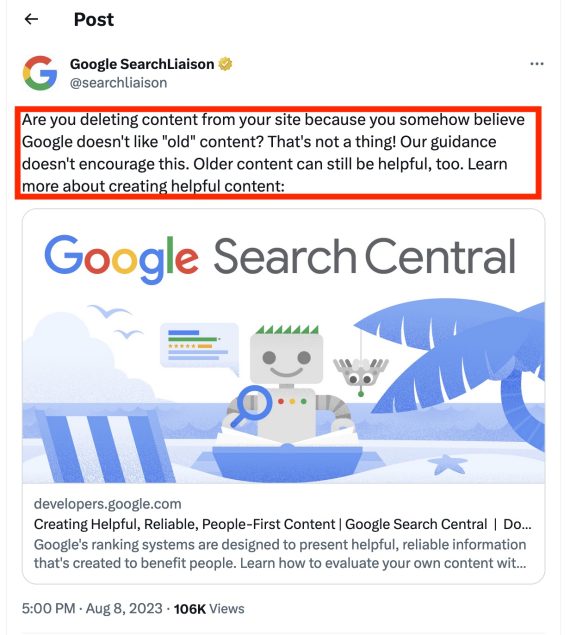SEO & Legacy Content – Practical Ecommerce

[ad_1]
Is deleting old content good for organic search rankings? Danny Sullivan, from Google SearchLiason, recently answered this question on his Twitter account, benefit Old content is not harmful and may be useful:
Are you deleting content from your site because you somehow think Google doesn’t like “old” content? This is nothing! Our guidance does not encourage this. Older content is still useful, too.
He linked the tweet to a post on Google Search Central,”Create useful, authoritative content that puts people first“.
Sullivan’s tweet will likely be answered Published reports CNET, the news and reviews site, has removed thousands of outdated articles to rank better in Google. CNET staff said the company focused on search engine optimization when deciding which posts to remove, evaluating the “age and length of the story, the number of visits to the article, and the number of times Google crawled the page.”
A lengthy discussion ensued on Twitter and elsewhere with answers from Sullivan and John Mueller, chief search analyst at Google. Here is a summary.
SEO and legacy content
1. Publication date is not in and of itself a rating factor.
The age of an article is not the only factor when deciding to delete it. Other metrics include traffic, bounce rates, time on page, and topic. Publishers must apply editorial judgment when segmenting content, recognizing the challenge it poses to mega sites like CNET.
John Mueller Confirmed on Mastodon The value of dated content – such as historical citations, archival research, technology tracking, and more:
The age of the content should not be the only deciding factor. (Just as traffic shouldn’t be the only factor.)
– News content (original reports) is different from random content sites, imo. There is usually value in old news content.
Just blindly deleting things does not improve your SEO.
—
You can use various factors to build a list of *potentially* spam – age, traffic, bounce, time on site, etc – it’s a starting point, but don’t use it as a deciding factor alone. Few people have read your About Us page, and it probably hasn’t changed in years, but I wouldn’t recommend deleting it, because it has unique value to your site and the web.
On the other hand, there are a lot of things that don’t have unique value anymore, by all means, get rid of them.
2. Deleting the selected content can help, but not because it is outdated.
In the comments that followed his tweet, Sullivan mentioned that deleting old content on a “huge site” could make it easier for Google to crawl other pages:
The same (dated and irrelevant) page is less likely to rank well. Removing it may mean that if you have a huge site, we’ll be better able to crawl other content on the site.
Hence Google has a crawling budget. Too many pages on a site can mean that Google is not crawling all of them. Removing articles can help organic rankings, but not because of the publication date.
So CNET’s decision to delete the old posts seems right for two reasons:
- It forces Google to crawl the most important pages of the site.
- No internal linking royalties will be wasted on older pages.
Likewise, permanently deleting unavailable product pages can help Google crawl other items, again for large sites. It can also submit more equity to available product pages.
3. Outdated content does not make the entire site outdated.
A common misconception among search optimizers is that deleting old content means that Google views the site as up-to-date and newer. Sullivan claims otherwisetweet:
We have systems with modernity in mind, as we document here: https://developers.google.com/search/docs/appearance/ranking-systems-guide#freshness
But this is largely (about) short-term freshness, not “I dropped all these articles after 2014 or something, so I’m more energetic!”
Delete or not?
Old content is a search engine optimization challenge. Dated articles often have historical significance. Conversely, these posts can prevent Google from crawling and assigning a value to the most recent information.
Keep humans in mind when cleaning the site. Is the old post still useful to readers?
It sure is a regular Content trimming and updating of manual editorial reviews Rankings could be improved. “useful content” from Google Guidelines Emphasize that, “…removing spam can help your other content rank.”
For huge sites like CNET, consider other tools than mass deletion based on age. One approach is to move older articles to a subdomain, which makes the main domain easier to crawl.
Regardless, age alone is not a negative ranking signal for Google.
[ad_2]
Source link





